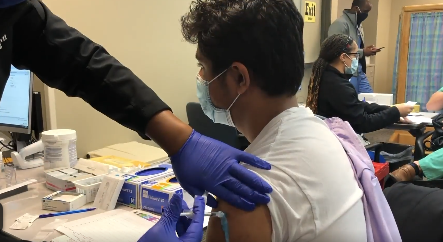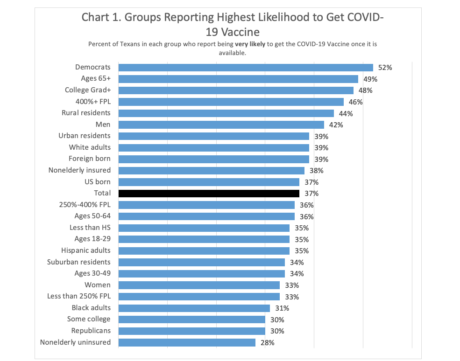
The survey shows that 37% of Texans say they are “very likely” to get a COVID-19 vaccine when it becomes available to them. Researchers found another 26% of adults across the state said they are “somewhat likely” to get a vaccine. Overall, the survey shows that three out of five Texans (63%) are at least somewhat likely to get a COVID-19 vaccine. However, researchers also found that one in five Texans (20%) still say they are “very unlikely” to get vaccinated.
The overall results from the December survey are similar to numbers from Episcopal Health Foundation’s COVID-19 in Texas poll in September. However, the percentage of Texans who say they’re very unlikely to get a vaccine dropped from 28% to 20% in the December survey.
“As the vaccine distribution begins, these numbers show why it’s so important to have clear messaging about the safety and effectiveness of COVID-19 vaccines,” said Elena Marks, president and CEO of the Episcopal Health Foundation and one of the authors of the report. “We know these vaccines will save lives, but communities most at risk of getting sick from COVID-19 may have to be convinced it’s worth it.”
Researchers found that Democrats (52%), Texans over 65 years old (49%), college graduates (48%), and people with higher incomes (46%) were the groups with the highest percentage who said they are very likely to get a vaccine.
Meanwhile, the survey shows that Black residents (31%), Texans with some college education (30%), Republicans (30%), and uninsured residents under age 65 (28%) were groups with the lowest percentage who said they are very likely to get a COVID-19 vaccine.
When it comes to race and ethnicity, the survey found similar percentages of Texans from all races who say they’re at least somewhat likely to get a vaccine when available (66% Hispanic, 62% White, 59% Black). That marks a large difference from the September poll. These new results show that more Blacks now say they’re likely to get a vaccine (49% to 59%), and the percentage of Blacks who say they’re very unlikely to get vaccinated dropped (36% to 21%).
Table 2: More Black Adults Now Say They Are Likely to Get Vaccinated in December 2020
| December 2020 | September 2020 | |
| Likely (NET) | 59% | 49% |
| Very likely | 31% | 28% |
| Somewhat likely | 29% | 21% |
| Unlikely (NET) | 39% | 50% |
| Somewhat unlikely | 18% | 14% |
| Very Unlikely | 21% | 36% |
*Don’t know/Refused not shown
“It’s good news that some Texans who have been most affected by COVID-19 now appear more likely to get vaccinated than earlier in the pandemic,” Marks said. “Reducing hesitancy and other barriers for communities of color and other at-risk groups is key to making sure every Texan has the same opportunity to get a COVID-19 vaccine when it’s available.”
Researchers found Texans’ likelihood to get a COVID-19 also varies depending on a person’s income and education level. The survey shows that 46% of higher-income Texans (incomes more than 400% of the federal poverty level) say they’re very likely to get vaccinated, compared to only 33% of Texans with lower incomes (under 250% of the federal poverty level). Researchers discovered that almost half (48%) of college graduates said they were very likely to get a vaccine, while fewer Texans with some college education (30%) and with high school or less education (35%) say they’re very likely to get vaccinated.
The survey also shows how the political divide during the pandemic in Texas now includes the likelihood to get a vaccine. Researchers found that more than half of Democrats (52%) say they’re very likely to get vaccinated, compared to less than one third (30%) of Republicans. In addition, only 8% of Democrats say they’re very unlikely to get a vaccine, but almost one third of Republicans (30%) said they were very unlikely to get vaccinated.
When it comes to age, researchers found that almost half of Texans age 65 and older (49%) say they’re very likely to get a vaccine, compared to 35% of Texans under age 65. However, the survey found that 70% of Texans under age 30 are at least somewhat likely to get vaccinated, compared to only 55% of Texans ages 30-49 and 62% of those ages 50-64.
METHODOLOGY
Episcopal Health Foundation’s survey was conducted from November 13 through December 9, 2020 in partnership with SSRS and included a representative sample of 1,204 Texas adults (age 18 or older). Interviews were conducted by live professional telephone interviewers in English or Spanish based on the respondent’s language preference.
The survey data are weighted to balance the sample demographics to match estimates for the Texas adult population. The margin of sampling error for this study is +/- 3.5 percentage points for results based on the total sample.
To schedule an interview, contact Brian Sasser at bsasser@episcopalhealth.org or 832-795-9404.
